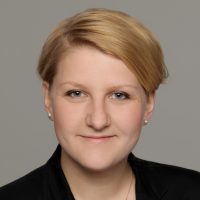Time for a Helsinki 2.0?

Liana Fix
Council on Foreign Relations
Liana Fix is a fellow for Europe at the Council on Foreign Relations (CFR). She is a historian and political scientist, with expertise in German and European foreign and security policy, European security, transatlantic relations, Russia, and Eastern Europe. She is also the author of A New German Power? Germany’s Role in European Russia Policy (Palgrave Macmillan, 2021). Dr. Fix’s work focuses on German domestic and foreign policy, the European Union, transatlantic relations, and Europe’s relations with Russia and China.
Prior to joining CFR, Dr. Fix was program director for international affairs at Körber-Stiftung in Berlin. She was also a resident fellow at the German Marshall Fund in Washington, DC, and a DAAD/AICGS fellow at the American Institute for Contemporary German Studies. From 2018 to 2019, she was a fellow for global governance futures at the Robert Bosch Foundation Multilateral Dialogues. From 2014 to 2016, Dr. Fix was a doctoral fellow at the German Institute for International and Security Affairs and associate fellow at the German Council on Foreign Relations. From 2012 to 2013, Dr. Fix worked as a Mercator fellow for international affairs at the German Federal Foreign Office, the EU Delegation in Tbilisi, and the Carnegie Moscow Center.
Dr. Fix has contributed essays, policy papers, and articles to peer-reviewed journals including Foreign Affairs, Foreign Policy, and the Washington Quarterly, among others. She is also a frequent contributor to international and German-language media.
Dr. Fix received her MSc in theory and history of international relations from the London School of Economics and Political Science and her PhD in political science from the Justus Liebig University Giessen. She is a member of the European Leadership Network Younger Generation Leaders Network on Euro-Atlantic Security and of Women in International Security.
In this two-part series, DAAD/AGI fellow Liana Fix explores both the potential and the challenges Germany faces when it embarks on the journey to reform the Organization for Security and Co-operation in Europe (OSCE) and tackle the growing concern of Russia’s ambition in Europe’s Eastern neighborhood ahead of Germany’s 2016 chairmanship of the organization. Analyzing the situation and drawing lessons from the legacy of the Yalta Conference and the Helsinki Final Act, as well as the interpretations they generated for the West’s engagement with Russia, Ms. Fix lays out the challenges ahead, as Russia exhibits renewed ambition to expand its sphere of influence in Eurasia. She suggests that Germany’s reform of the OSCE needs to include new humanistic dimensions that are rooted in fundamental freedom and embody the principles of the Helsinki Final Act.
The articles originally appeared in The Intersection Project: Russia/Europe/World on September 16 and 18, 2015. Click here to read.








